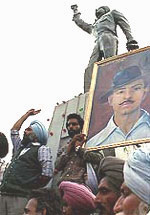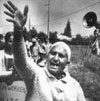
"Menghaobi" Irom Sharmila Chanu (born March 14, 1972), also known as the Iron Lady of Manipur, is a civil rights activist, political activist, journalist and poet from the Indian state of Manipur. Since November 4, 2000, she's been on a political fast demanding the Government of India to withdraw the Armed Forces (Special Powers) Act, 1958, also otherwise known as AFSPA, from Manipur and other areas of India's north east.
Ten years since it began in 2000, Irom Sharmila Chanu's fast is unparalleled in the history of political protest.
Young, stoic and dogged, Irom Sharmila has been on a fast-unto-death since November, 2000. She wants the repressive Armed Forces (Special Powers) Act repealed. The Act gives draconian powers to the security forces and has repeatedly been used with brazen brutality in the Northeast. For five years, she has been imprisoned and force-fed by the State for her ‘crime’. Filmmaker Kavita Joshi spoke to her in the hospital room in Imphal, her prison
 |
Soul Fight: Sharmila in her hospital room Photos by Kavita Joshi |
Irom Sharmila has not eaten for over five years now. For this, she has been locked up in jail by the government under very dubious charges and is being forcibly nose fed. Since November 2000, Sharmila has been on a fast-unto-death, demanding the removal of the Armed Forces (Special Powers) Act 1958 (AFSPA). AFSPA is a law that can come into force in any part of India declared as “disturbed”. The act allows anyone of any rank in the army or a paramilitary force under its operational command to shoot, arrest or search without warrant; and to kill on suspicion alone. Furthermore, there is little scope for judicial remedy. The whole of Sharmila’s state — Manipur — has continuously been under this law since 1980 (with minor exceptions in recent times).
It’s been five years since that day which changed her life. November 2, 2000 was just another Thursday. Till, that is, a convoy of Assam Rifles was bombed by insurgents near Malom in Manipur. In retaliation the men in uniform went berserk: 10 civilians were shot dead. You could say that neither the killings nor the brutal combing operation that followed were new to the people. Manipur had been ravaged by umpteen number of such incidents in the past. But for Sharmila, Malom was the proverbial straw that broke the camel’s back. “There was no means to stop further violations by the armed forces,” she says. She began her epic fast.
From then to now, Sharmila’s frail body has become a battlefield. Within days of her fast, she was arrested on charges of ‘attempted suicide’ and put in jail. She refused bail; she refused to break her fast. For five years now, she has been in custody, being forcibly nose-fed. Time and again, the courts have — rightly — released her. But she resumes her fast and is invariably re-arrested each time.
In the five years that she hasn’t eaten, Sharmila’s body has begun to get damaged severely. She lives with the nagging pain of a tube thrust into her nose. She is 35 but has become feeble and looks older. What’s more, for five years, Sharmila has not seen her ageing mother. In her mother’s own words, “I am weak-hearted. If I see her, I will cry. I do not want to erode her determination, so I have resolved not to meet Sharmila till she reaches her goal.”
In times that are inured to violence, Sharmila’s protest is remarkable for its insistence upon the Gandhian ideals of ahimsa (non-violence) and satyagraha (insistence upon truth). And though her protest is ignored every day in the world’s largest democracy, Sharmila is resolute — “Unless and until they remove the AFSPA, I shall never stop my fasting.” In a rare interview, shot for the film Untitled: 3 Narratives — On Women and Conflict in Manipur, she unravels her heart, slowly, like a stream of amazing struggle and hope amidst intense despair.
Why did you start upon this fast?
For the sake of my motherland. Unless and until they remove the Armed Forces (Special Powers) Act 1958, I shall never stop my fasting.
Could you tell me something about the incident that sparked this off for you?
I had gone there (to Malom) to attend a meeting. The meeting was towards planning a peace rally that would be held in a few days.
I was very shocked to see the dead bodies on the front pages of the newspapers. That strengthened me to step on this very threshold of death. Because there was no other means to stop further violations by the armed forces against innocent people.
I thought then, that the peace rally would be meaningless for me. Unless I were to do something to change the situation .
But why choose this particular method? Why a fast unto death?
It is the only means I have. Because hunger strike is based on spirituality.
What about the effect this has on you, your health, your body?
That doesn’t matter. We are all mortal.
Are you certain that this is really the best way? To inflict this upon your body?
It is not an ‘infliction’. This is not a punishment. I think this is my bounden duty.
 |
‘Although the State may think so, I am in no mood for suicide. In any case, if I were a suicide-monger, how could we talk like this? I have no other choice but fasting’ |
My mother knows everything about my decision. Although she is illiterate, and very simple, she has the courage to let me do my bounden duty.
When did you last meet your mother?
About five years ago. There is an understanding between us. That she will meet me only after I have fulfilled my mission.
It must be very hard on both of you…
Not very hard… (pauses). Because, how shall I explain it, we all come here with a task to do. And we come here alone.
Just why are you in custody? Why exactly?
It is not my will. But the State insists it (the hunger strike) is unlawful.
But the government is saying that your fast-unto- death is attempted suicide, which is an offence…
Although they may think so, I am in no mood for suicide. In any case, if I were a suicide-monger, how could we communicate like this, you and I? My fasting is a means, as I have no other.
How long are you prepared to go on like this?
I don’t know. Though I do have hope. My stand is for the sake of truth, and I believe truth succeeds eventually. God gives me courage. That is why I am still alive through these artificial means. (Indicates the tube going into her nose.)
How do you spend your day in the hospital?
A lot of the time I practice yoga. It helps me keep my body and mind healthy. (She points to the tube again.) It is circumstances that make things natural. Though this (tugs the tube) is unusual, it is natural to me.
What do you miss the most?
The people. As I am a prisoner here (in hospital), everyone is restricted from meeting me without permission. So I miss people a lot.
If you had one wish that was yours for the asking, what would it be?
My wish? We must have the right to self determination as rational beings.
Do you think the AFSPA will be repealed? Will you get what you are fighting for?
I realise my task is a tough one. But I must endure. I must be patient. That happy day will come some day. If I’m still alive. Until then, I must be patient. (My time was over, and my crew and I were preparing to leave, when Sharmila stopped us.) Will you help me? I would like to read about the life-history of Nelson Mandela. I have no idea about his life. Will you send me a book about him? It is full of restrictions here. Make sure you address it to the security ward. If not, I may not recieve it.
(We sent Sharmila, the book from Delhi. Her friends tell us that it has reached her.)
courtesy:tehelka


 Patwardhan has a distinctive filmic “voice” in a literal sense: in his films we often hear him speak, as narrator or thoughtful questioner. He often does his own camerawork, providing a feeling of directness, a personal eye. His films have found acclaim at festivals worldwide, but he has often been forced to fight Indian censors for the right to show them in his native country. The problems he addresses—economic inequality, environmental devastation, the challenges faced by secular and democratic movements in an era of fundamentalism and nationalism—are dangerous and crucial, and clearly as relevant here as they are on the subcontinent.
Patwardhan has a distinctive filmic “voice” in a literal sense: in his films we often hear him speak, as narrator or thoughtful questioner. He often does his own camerawork, providing a feeling of directness, a personal eye. His films have found acclaim at festivals worldwide, but he has often been forced to fight Indian censors for the right to show them in his native country. The problems he addresses—economic inequality, environmental devastation, the challenges faced by secular and democratic movements in an era of fundamentalism and nationalism—are dangerous and crucial, and clearly as relevant here as they are on the subcontinent. 







 Binayak Sen is a pediatrician, public health specialist[1] and national Vice-President of the People's Union for Civil Liberties (PUCL). He is currently on bail on controversial charges laid by the state of Chhattisgarh.
Binayak Sen is a pediatrician, public health specialist[1] and national Vice-President of the People's Union for Civil Liberties (PUCL). He is currently on bail on controversial charges laid by the state of Chhattisgarh.